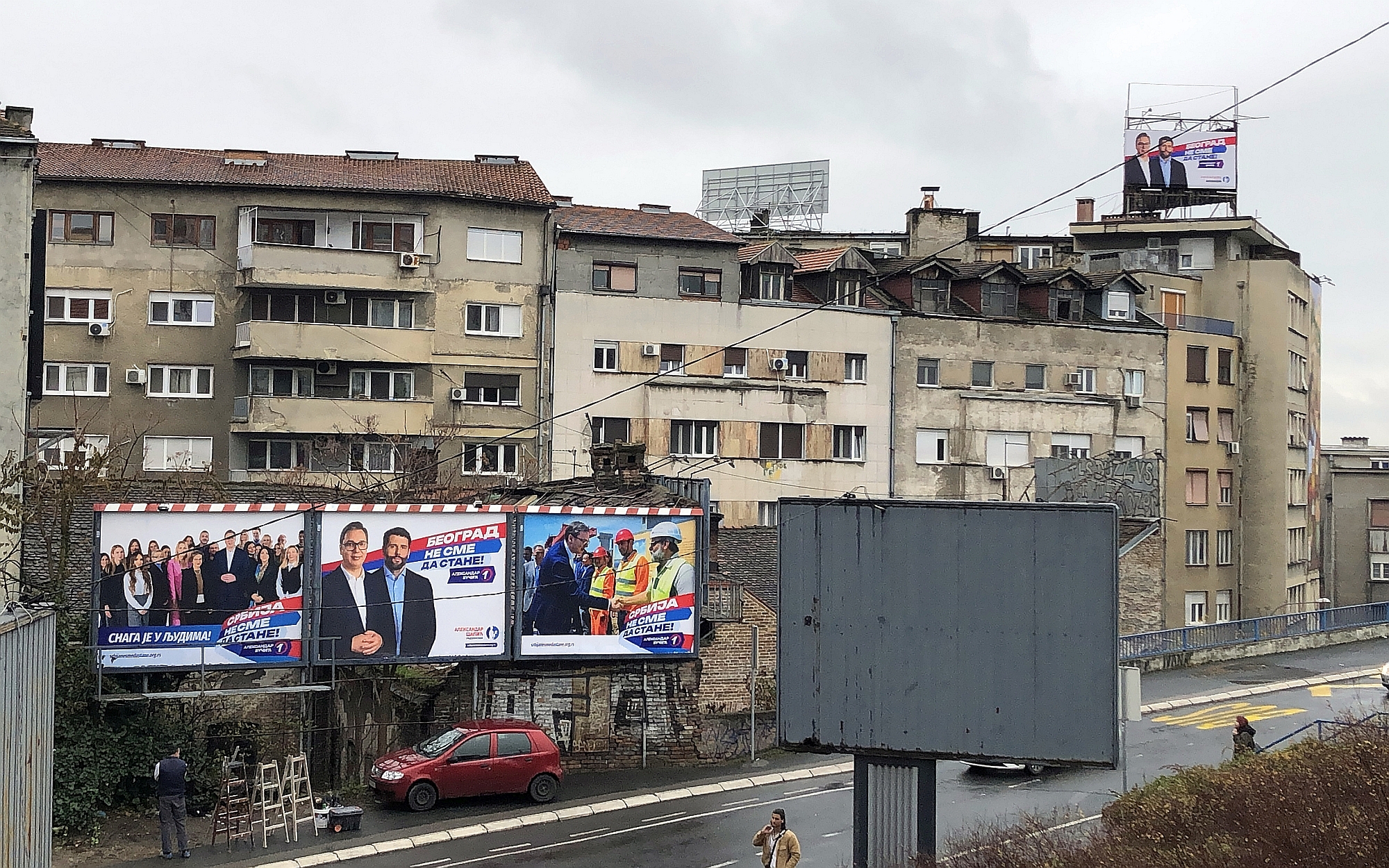Serbia
Election in the shadow of an all-powerful president

When the citizens of Serbia are called upon to elect a new parliament on Sunday, over sixty percent of those eligible to vote think they are voting on their president, Aleksandar Vučić. Although he is not up for election at all, he is omnipresent both in the public debate and in the public sphere.
The boundaries between the state and President Aleksandar Vučić’s all-powerful Serbian Progressive Party (SNS) are becoming increasingly blurred. Without exception, the president is personally responsible for everything positive in the country, while everything bad has occurred despite the president’s self-sacrificing efforts, mostly against the overwhelming but hypocritical “West”.
It is therefore not surprising that more than half of those eligible to vote believe that the parliamentary election called prematurely by Vučić is about the future of their president. The list with which the SNS is running for election is accordingly called “Aleksandar Vučić – Serbia must not stand still”. Moreover, the president is smiling from all the election posters, even though a) he is not standing for election and b) also in Serbia he would be obliged to maintain a party-political neutrality. However, the rule of law is no longer a benchmark in Vučić’s Serbia.
State and party are one
For example, three weeks before the election date, government paid out 20,000 dinars (approx. 170 EUR) to over 1.6 million pensioners in the country for no particular reason. Parents of schoolchildren were given 10,000 dinars (approx. 85 EUR) as a gift. In Serbia, the president himself announces all of this: Aleksandar Vučić addressed his people live on television over three hundred times this year alone, with an average speaking time of forty minutes per address. On the public evening news, the president received fourteen times more airtime than the entire political opposition combined: eleven and a half hours were devoted to the president, 44 minutes to the opposition.
However, SNS is not only securing its re-election through the misuse of taxpayers’ money and unfair media coverage. Public employees in particular report pressure to vote for the “party that supports the state” and to send their superiors cell phone photos of their filled-out ballot papers. In a country where not only the public administration but also the electricity and gas supply, postal services and telecommunications are state-run, that’s a lot of voters. There are also well-founded suspicions of voter list manipulation and the misuse of citizens’ private data.
Regression instead of democratic consolidation
In addition, not only will the parliament be re-elected on December 17, but also local elections will be held in almost half of all Serbian municipalities. President Vučić had previously determined which mayors would have to resign, and they promptly did so. Among other places, a new city assembly will also be elected in Belgrade. There are indications that party members from places where local elections are not held are registered in municipalities where elections are held. This is how the SNS increases its electorate.
“In a normal country, elections are a celebration of democracy”, says Raša Nedeljkov, head of the election observation mission of CRTA, the country’s largest democracy watchdog and a long-standing partner of the foundation. “In Serbia, however, there are so many unanswered questions: why were local elections called in only some of the municipalities? Are the state institutions neutral or do they serve a particular party? How much trust can citizens have in electoral lists that come from a state apparatus led by the ruling party?”
“Serbia against violence” moves the masses
Despite all inconsistencies in the run-up to the election date, there is at least reasonable hope in the capital that the SNS’s autocratic rule will end. It was in Belgrade where, after two unrelated massacres in which two young perpetrators killed a total of nineteen people, most of them young people and children, nationwide mass protests began in May, bringing hundreds of thousands onto the streets. A citizens’ movement against the glorification of violence in Serbian society gave rise to the oppositional electoral alliance “Serbia Against Violence”, which was joined by almost all democratic parties.
The alliance, which is running jointly in both the parliamentary and many local elections, is led by the social-democratic “Party for Freedom and Justice” and is supported by left-wing, green and conservative parties. The liberal “Movement of Free Citizens” (Pokret slobodnih gradjana, PSG) with its 30-year-old chairman Pavle Grbović also joined “Serbia against Violence” early on. The young liberal party, currently represented with three seats in the Serbian parliament, hopes to have more MPs in the “Skupština” in the future.
“The disregard for the true needs of citizens, the implementation of infrastructure projects that do not serve the common good, and the comprehensive capture of the state by interest groups are also forms of violence against citizens”, explains Grbović. “Our advantage is the people – citizens who have already dared to stand up to autocracy. You can believe the television or not, but being confronted every day with the uncertainty of whether there will be enough money for buying groceries at the supermarket checkout, whether your child will come home unharmed, or feeling cheated when the incompetent are always preferred because they have political connections, are personal experiences that speak for themselves."
Aleksandar Vučić however is confident of victory: “We will beat them more convincingly than ever”, he announced a few days before the election. “The average wage will double in four years, we will lead Serbia into the EU while at the same time expand our friendship with Russia and China. And we will never recognize Kosovo!” Such pipe dreams are enough to keep a population completely blinded by the media in line.
Markus Kaiser is project director for the Western Balkans for the Friedrich Naumann Foundation for Freedom, based in Belgrade.
